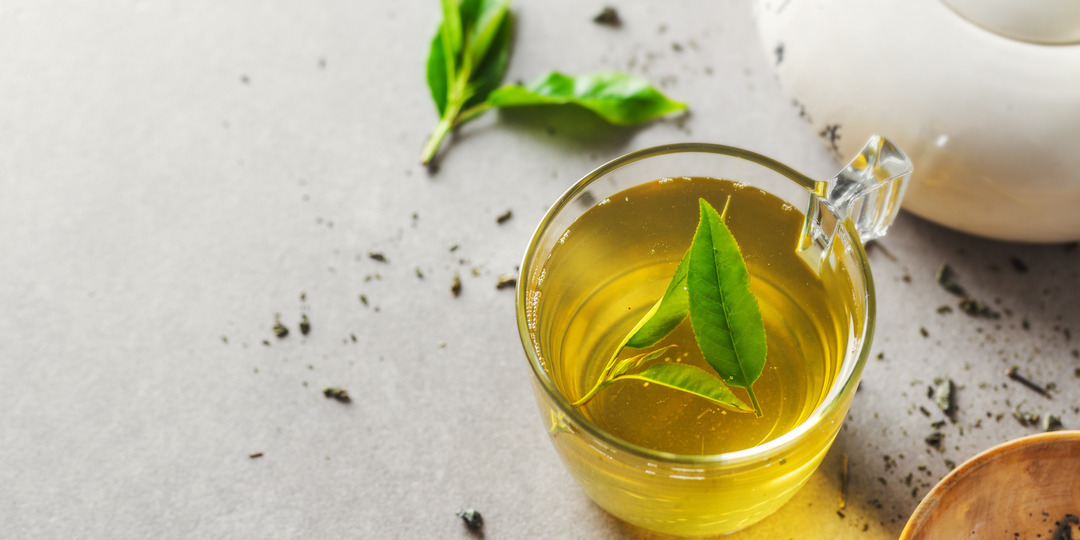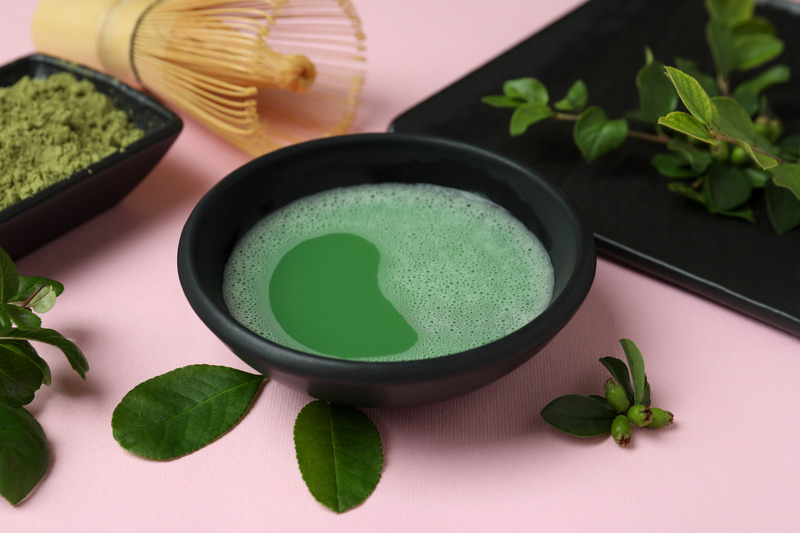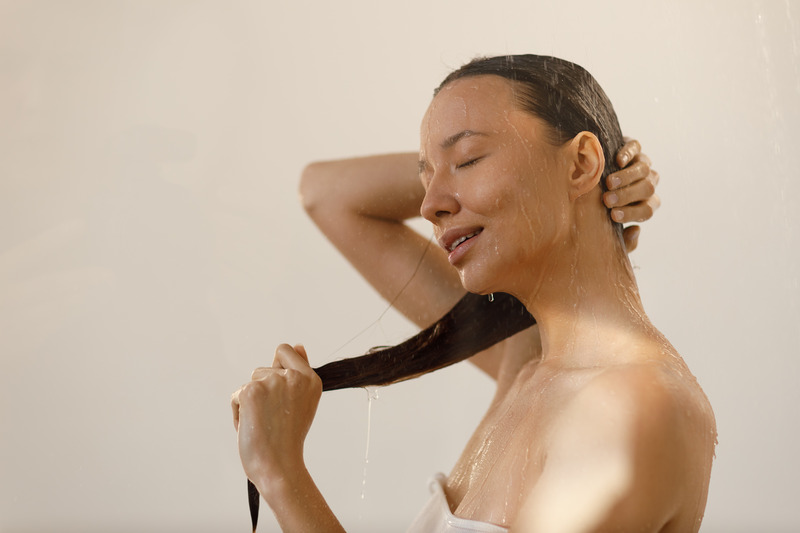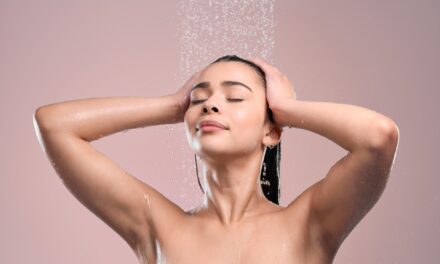
Many of us know green tea is excellent for our health and are probably drinking green tea already. But did you know it is very beneficial to your skin and hair, too? Rich in antioxidants and nutrients, including flavonoids and vitamins, green tea helps nourish and nurture hair, combat hair loss, promote hair growth, and offset cell damage due to oxidative stress.
Let’s learn about the benefits of green tea and how to use green tea hair rinses for the best results.
Why Green Tea for Your Hair?
Nowadays, many have resorted to drinking green tea for its many health benefits. But let’s take a look at how green tea can benefit hair.
Green tea has a rich nutrient profile, including epigallocatechin gallate (EGCG), a potent antioxidant that helps protect cells from oxidative damage. It helps reduce skin and hair cell damage and inhibits testosterone and dihydrotestosterone levels, key contributing factors for hair loss.
It helps control hair loss and stimulates hair follicles to increase hair growth. Rich in nutrients like vitamins A, E, C, and several B vitamins, minerals like zinc, manganese, and chromium, and antioxidants, green tea improves the overall health of hair and scalp.
The rich antioxidant content in green tea helps strengthen hair follicles and reduce hair thinning. Green tea improves blood circulation to the scalp, moisture, and hydration levels of hair and scalp.
Zinc in green tea helps prevent dandruff and regulate the scalp’s sebum levels. Green tea’s antifungal and antibacterial properties help combat scalp issues, including itching, dandruff, etc.
DIY Green Tea Hair Rinse

Now that we know how green tea can benefit hair let’s look at how to use it. Green tea hair rinse is probably the easiest way to incorporate this excellent ingredient into your hair care regimen.
Ingredients You’ll Need
You can modify This basic recipe according to your preferences and requirements. So, let’s look at what we need to make the green tea hair rinse.
Green Tea Leaves (or) Bags – 2 – 4 Bags (or) 2 Tbsps.
Water – 2 – 4 Cups
Optional Ingredients
Rosemary Essential Oil – a few drops (for hair growth)
Vitamin E Oil – a drop or two (for nourishment)
Glycerin – 1 Tsp. (For moisturization)
Lemon Juice – 3 Tbsps. (For Silky Hair)
Apple Cider Vinegar – (for shine, balances scalp pH levels, clarifies scalp)
Lavender Essential Oil – a few drops (Promotes hair growth, soothes and calms an itchy and irritated scalp)
Black Tea Leaves (or) Bags – 2 Tbsps (or) Tea Bags (Intensifies color in dark hair for added shine)
Nettle Leaves – 1 Tsp (Combats hair loss and improves luster)
Like this, you can add hair-beneficial ingredients for value addition.
Step-by-Step Guide to Making Your Green Tea Hair Rinse
- Bring the water to a rolling boil and add green tea to it.
- Let it steep for a few minutes and allow it to cool down.
- Your green tea hair rinse is ready.
- If you’re adding black tea or herbs, add them with green tea and let them steep.
- If you’re adding lemon juice, you can add it when the green tea rinse has cooled down.
- If you add apple cider vinegar, you can add it after the tea rinse cools.
- If you add essential oils, wait for the tea rinse to cool down fully before adding them.
- Add glycerin, Vitamin E, or other oils while the tea rinse cools.
How to Use Your Green Tea Hair Rinse
You can brew a strong green tea, spray it on your locks, massage it into your scalp, and wait at least 25 minutes before washing it off. If you spray it after you wash your hair, let it sit for a few minutes.
Alternatively, you can pour over the green tea rinse on your head, covering all areas and massaging the scalp after pouring it over. You can rinse off after a few minutes.
Variations of Green Tea Hair Rinse
If you have lighter locks, refrain from using black tea, as it can stain them.
When you pour over the rinse, do it slowly and divide your hair while pouring over to ensure all areas are covered. Proceed to massage for a few seconds and let it sit for a few minutes. Wash off and air dry your hair.
Green tea and lemon juice both regulate the scalp’s sebum levels. So, for those with dry hair, don’t forget to do a patch test to see how it works for you.
You can add herbal tea to the green tea hair rinse. Herbs like nettle, false daisy, water hyssop, margosa, chamomile, etc. are good choices.
You can add aloe vera juice for hydration, nourishment, and shine.
Additional Tips for Maximum Benefits

- Green tea hair rinse alone is not the be-all for hair and scalp care. Having a proper hair care routine helps improve the overall health of your hair.
- You can consider additional ingredients for added benefits.
- Use hair masks regularly to help nourish, nurture, and revive hair.
- Air your hair as much as possible and give your hair dryer a miss.
- Eating a healthy and balanced diet is the key to hair health.
- Always use cold water to wash your hair. If you can’t do that, try using lukewarm water at least. Hot water strips off essential natural oils from your hair.
Bottom Line
Natural hair treatments may take time, but they surely help and are free from harmful side effects common with chemicals. Making green tea hair rinse a part of your hair routine helps promote hair growth, curb hair loss, soothe itchy scalp, etc.
Depending on your requirements and preferences, tweak the recipe and try it out. You don’t have to use all the optional ingredients; just use what you need.
For example, thinning hair can benefit from herbs like Rosemary. So, choose accordingly and do your experimenting.
Don’t have time for DIY? We have you covered with a range of premium vegan hair care products from Vitamins Revive. Check out their online store to learn more about their products and how they can benefit you.
As always, feel free to write to us with any questions, feedback, requests, or concerns, and keep us posted with your results.
FAQs
Is black tea hair rinse a natural coloring option?
Tea, like coffee, can stain hair temporarily or enhance dark hair shades. This lasts a few days, but you need more ingredients to use it as a hair coloring option. Hair rinses as such might just make your locks a little darker. It can stain white, blonde, or light brown hair.
Is black tea rinse good for hair?
Yes, like green tea hair rins, black tea does have its benefits and can be used along with green tea for added benefits. As long as you’re not worried about the staining, nourishing and enhancing your hair color are options.
Can hair rinses help stimulate hair growth?
Yes, when used regularly, hair rinses help promote healthy hair growth.
Can we add essential oil to hair rinses?
Of course, essential oils can be added to the green tea hair rinse.
Does green tea hair rinse help improve scalp health?
Yes, the rich nutrient content nourishes the scalp, and green tea’s antibacterial and antifungal properties help combat scalp issues, including dandruff.
Can we wash our hair after using a hair rinse?
As the name suggests, it’s for use as a post-hair wash and can be rinsed out. There’s no need to apply shampoo after using a hair rinse.









